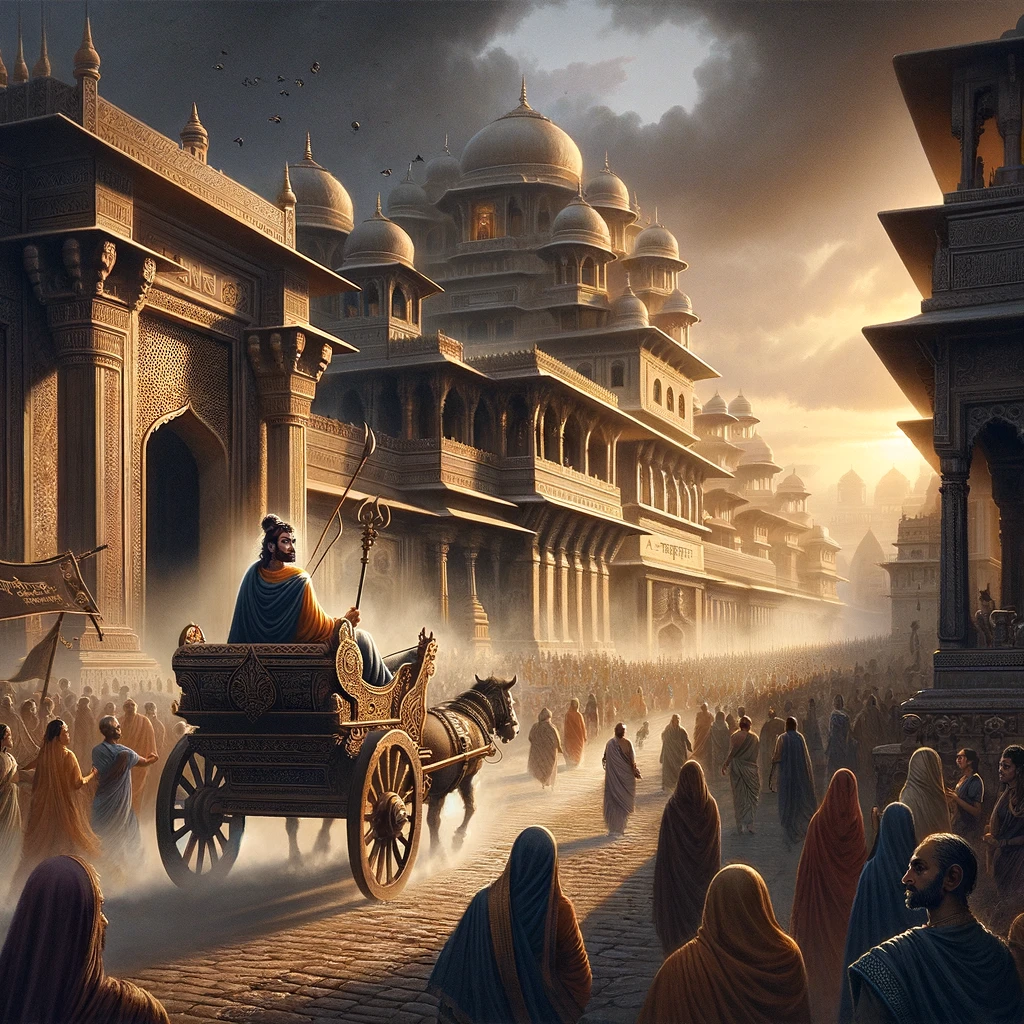Summary
Sumantra takes leave from Guha, who learns from his spies that Rama departed for Chitrakuta. Sumantra drives back to Ayodhya. Entering the royal gynaeceum, he submits to the emperor what he earlier reported to the citizens who followed his chariot. Dasaratha and Kausalya fall into a faint to hear about Rama’s departure for Chitrakuta. All the inmates of gynaeceum weep loudly in anguish.
Chapter [Sarga] 57 in Detail
While Rama landed upon the southern shore, Guha conversed for a long time with Sumantra and with much distress, went to his house.
It was gathered by those who were there (Guha and others) about Seetha, Rama and Lakshmana coming to sage Bharadwaja, their staying with him in Prayaga and their departure to Chitrakuta Mountain.
Sumantra, being allowed to depart by Rama, tied excellent horses to the chariot and with intense anguish, rode towards the very city of Ayodhya.
Sumantra, seeing the sweet-smelling woods, rivers, lakes, villages and towns on the way, soon crossed them.
Reaching Ayodhya in the evening time of the third day Sumantra saw that city, joyless.
Beholding Ayodhya as if deserted in silence, Sumantra becoming very much distressed in mind and having afflicted with intense anguish, surmised as follows:
“I hope the city of Ayodhya with its elephants, horses, people and the kings was not burnt away by a fire of sorrow and blazing grief towards Rama.
Sumantra, thus lost in thought, reaching the city-gate through the fast-running horses, entered the city quickly.
Meanwhile, seeing Sumantra the charioteer approaching, hundreds and thousands of people ran towards him asking, “Where is Rama?”
He replied them thus: “Bidding farewell to Rama at the shore of Ganga when sent back by that virtuous and high-souled Rama, I returned here.”
Hearing that Seetha, Rama and Lakshmana had crossed River Ganga, the people with their faces filled with tears sighed, “Oh, fie upon us! And cried aloud, “Alas, Rama!”
Sumantra also heard the words of those people standing in groups and telling, “Lost indeed are we, who do not see Rama here!”
“Never again can we see the pious Rama on the occasions of bestowing gifts, sacrificial performances or marriages or in large meetings.
The city of Ayodhya was protected by Rama, as by a father, with due regard to what was appropriate, what was congenial and what brought happiness to its people.
While driving through bazaars, Sumantra heard the sounds of lamentation of women, coming forth from windows, consumed by anguish on account of Rama’s exile.
Going through the middle of the royal highway, Sumantra by covering his face, reached the house of Dasaratha.
Sumantra descended from the chariot, entered quickly the royal palace and traversed the seven inner apartments of the palace, filled with a large number of people.
Then, finding the forthcoming Sumantra from their large mansions, from seven-storied buildings and from royal palaces, the women who had been emaciated in not being able to see Rama, cried “Alas! Alas”.
Those women, extremely confounded with grief with their long and bright eyes filled with a stream of tears, looked at each other imperceptibly.
Sumantra also heard the feeble conversation of Dasaratha’s wives absorbed in anguish on account of Rama’s exile, from their respective inner apartments.
“What Sumantra will reply to the lamenting Kausalya, when he now returns here without Rama while he formerly went out with Rama?”
“In spite of her son (Rama) having left Ayodhya, Kausalya continues to survive. I think that surely it is difficult thus to live and it is not so easy to preserve it too!”
Hearing those credible words of Dasaratha’s wives, Sumantra all at once entered the house, that appeared to be set ablaze with grief.
Sumantra entered the eighth inner apartment and saw in that white house, King Dasaratha the miserable the sick and the exhausted man on account of the exhausted man on account of the grief for his son.
Sumantra approached that king who was seated, offered his salutation and presented Rama’s message as told.
That king heard silently the message of Rama, was bewildered, afflicted by grief, for his son, became fainted and fell on the ground.
The king thus having fainted, the gynaeceum was hurt. While the king was falling on the ground, the inmates of gynaeceum wept, raising their hands in distress.
Kausalya along with Sumitra lifted up their husband, who fell on the ground. Kausalya also spoke these words to Dasaratha.
“Oh, illustrious king! Why are you not speaking to this Rama’s messenger who came from the forest and who has done difficult things?”
“Oh, Dasaratha! After doing an evil act, you are now feeling shameful. Rise up! Let it be a meritorious act for you. You cannot get a help, when you weep like this.”
“Oh, king! On whose fear, you are not enquiring with Sumantra about the welfare of Rama, that Kaikeyi is not here. Speak fearlessly.”
Kausalya, speaking excitedly in tears and entirely given up to anguish uttered thus to the monarch and soon fell to the ground.
All those women cried in loud voice, seeing Kausalya fallen on the ground weeping as aforesaid and gazing their husband too (lying unconscious).
Hearing that crying sound raised in gynaeceum, all aged and young men and women on all sides gathered around weeping. The city then again became disturbed.
Thus completes 57th Chapter of Ayodhya Kanda of the glorious Ramayana of Valmiki, the work of a sage and the oldest epic.
Sriman Moola Rama Vijayate


